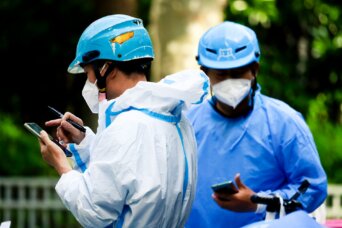- About
- Topics
- Picks
- Audio
- Story
- In-Depth
- Opinion
- News
- Donate
- Signup for our newsletterOur Editors' Best Picks.Send
Read, Debate: Engage.
| topic: | Political violence |
|---|---|
| located: | China |
| editor: | Amy Liu |
Authorities in China’s Guangzhou apologised on 18 July for entering 84 households without consent while the residents were being relocated to hotel quarantines due to COVID-19, sparking concerns over abuses of power.
Certain videos of doors with signs of damage first appeared on China’s twitter-like social media platform Weibo: one had a seal that read “The Regional Prevention and Control Office,” while some were marked with the words "refused to sterilise.” Concerned residents questioned whether illegal intrusions were necessary. According to the current law of the health authorities, officials are not allowed to gain access to private houses by force.
The property management business then revealed that various departments, including the Disease Control department, worked together to forcibly enter the flats in a six-storey building since it was believed that people who had come into close contact with confirmed patients were hiding at home.
"A task force will be immediately established to carry out a thorough and in-depth examination. According to the investigation's findings, pertinent staff would be dealt with severely in accordance with the law and regulations." The district Command Centre for COVID-19 Control and Prevention apologised for the incident in a statement, and said that it has fully recorded the process of breaking locks and entering houses and has also reinstalled the locks to secure residents' properties.
Even though the district authority admitted how rude they were to ignore residents' feelings, issued individual apologies and compensated the residents, it was of little help as the discussion continued online, with fingers pointing towards the authorities for using COVID-19 as an excuse to break the law.
It is not the first time authorities have entered private households without consent using the pretence of COVID. Three months ago in Shanghai, there were different voices opposing the intrusion of white-clad health workers into the flats of confirmed patients, or even close contacts, by force to take them away or spray disinfectants.
China's hardline epidemic prevention measures have long been questioned, recently one of the Guangdong People's Congress representatives even proposed providing persons who had not received vaccinations with blue health codes, although this was eventually rejected by the health authorities.
Since the COVID-19 outbreak began, Chinese residents have been accustomed to following the prevention measures, doing frequent PCR tests as soon as cases are identified in the neighbourhood, and using the health code app to enter various venues. While the authorities are performing their duties, it is their responsibility to safeguard citizens' rights and freedom. What happened in Guangzhou involved the illegal transgression of several departments that overstepped the law.
It is important to consider whether these are occasional mistakes, and if the strict epidemic prevention measures can push away household privacy and shatter the trust between the government and its people.
Photo by Xiangkun Zhu

